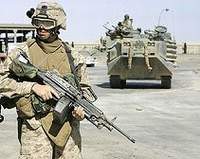US marine takes challenge to prove he only followed orders to kill Iraqi man last year
A Marine who withdrew his guilty plea to kidnapping and murdering an Iraqi man will have a difficult time proving he was only following orders, military experts said.

Cpl. Trent D. Thomas stunned a military courtroom at Camp Pendleton when he claimed that he took part in the killing of Hashim Ibrahim Awad only because his squad leader ordered him. Ibrahim, 52, was dragged from his home and shot last year.
Gary Solis, a former Marine Corps prosecutor and judge who teaches law of war at Georgetown University Law Center, said Friday that Thomas must persuade a court that the serviceman received a direct order, and that he didn't know that the order was unlawful.
"Obedience to orders is traditionally a weak defense," Solis said. "You can't hide behind it unless you did not and could not reasonably have been expected to know the order was unlawful."
Thomas, 25, withdrew his guilty pleas on Thursday, the second day of his sentencing hearing, and one of his lawyers said his client had an "epiphany" the night before.
Thomas pleaded guilty Jan. 18 as part of a plea agreement with prosecutors that would have provided him a cap on his jail term.
Thomas was one of a squad of seven Marines and a sailor accused last year of hatching a plot to kill an Iraqi in the town of Hamdania. Four others already pleaded guilty to lesser charges. Thomas, the squad's second in command, was the first to plead guilty to murder.
Prosecutors said Thursday they would file new charges within days. If convicted, he may be sentenced to the death penalty, though that appears unlikely.
Maj. Haytham Faraj, one of Thomas's military lawyers, said Friday that Thomas' change of heart was heavily influenced by the testimony of Navy Seaman Recruit Melson J. Bacos, the Navy corpsman who was attached to the Marine squad the night of the killing.
Bacos testified Wednesday that Thomas was instrumental in kidnapping Awad, but he said the corporal was a good man and argued that if Thomas had been the squad leader, the killing would not have happened.
Faraj said that Thomas thought, "Hey, I'm not really the monster they are making me to be."
Three other Marines and the sailor have each been sentenced to less than two years in prison. Their plea deals required them to testify they knew at the time of the killing that it was unlawful, the AP reports.
"If those more junior folks were accepting the fact they were not following a lawful order, it seems to me even harder for the second-most senior to turn around and say, 'I thought I was following a lawful order,"' said David Glazier, a professor at Loyola Law School Los Angeles who teaches the law of war.
Thomas told the judge Thursday that he thought he was following orders from squad leader Sgt. Lawrence G. Hutchins III.
Hutchins' attorney did not return phone messages Friday; he has said he did not think Hutchins did anything wrong.
Although Thomas gave detailed testimony last month about how he fired several rounds into Awad's body and then tried to cover up the killing, that account cannot be used at trial. Thomas can ask to be tried by a judge or by a jury, which in the military is usually made up of between five and 12 members.
He can request that at least one-third of the jury is made up of enlisted Marines.
"It's going to be a difficult task for them, given the strength of the government's evidence," Solis said. "But stranger things have happened."
Subscribe to Pravda.Ru Telegram channel, Facebook, RSS!




